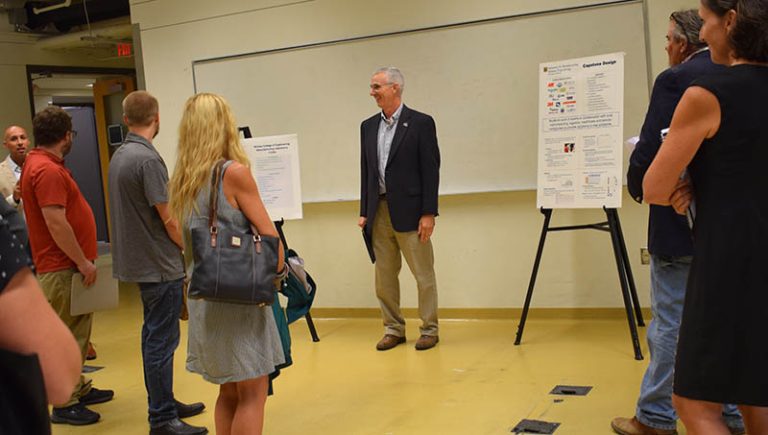
From graduating workforce-ready engineers to partnering on research and development, Mizzou Engineering has a lot to offer mid-Missouri manufacturers. That was the main take-away from an MU Manufacturer Connection Event the College hosted on Tuesday.
The event brought about 40 manufacturing and economic development leaders to campus to hear updates from the College and to tour engineering facilities. MU Extension organized the event to help business leaders connect to resources across the four UM System campuses.
Professor Jim Noble, chair of the Department of Industrial and Manufacturing Systems Engineering (IMSE), said he hopes visitors left with some ways in which they might partner with Mizzou Engineering.
“We can provide assistance in every aspect of their organization, from materials, product design, processes design to operations analysis and supply chain logistics,” he said. “I think some of the employers were very excited about knowing there are qualified students in the talent pipeline, and I think the event awakened them to the amazing resources available in their backyard.”
Noble is director of the Center for Excellence in Logistics and Distribution (CELDi). CELDi is a graduated National Science Foundation I/UCRC, which is a consortium of six major research universities and numerous industry members. Through CELDi, industry partners can access expertise and network with peers through annual events such as the CELDi Research Symposium.
The IMSE department also has faculty who can provide expertise in applied operations, data analysis, transportation logistics, healthcare systems and human-computer interaction.
“We are here to do the research for you,” Mizzou Engineering Dean Noah Manring told attendees during a welcome session. “We can take on those high-risk ideas and do preliminary testing for new product development. We’re always here to do that, and we have ways to contract with you to do that.”
Another resource at Mizzou Engineering is the Midwest Industrial Assessment Center (IAC), which provides manufacturers with free energy assessments. The IAC aims to help companies cut down on energy consumption, carbon dioxide emissions and realize significant cost savings, Director Sanjeev Khanna told attendees. The IAC is funded by the US Department of Energy, which provides training for IAC student interns to conduct the energy assessments. To date, that work has resulted in more than $102 million in energy cost savings. More than 300 manufacturing plants in Missouri and Kansas have availed IAC energy assessments, with more than 80 students graduating from the program.
Mizzou Engineering’s main economic contribution to the state is by preparing the workforce, Manring said. He pointed to a 2013 study that showed a single engineer in Missouri contributes to $3 million in gross domestic product. Just looking at the public universities with engineering programs, that amounts to about $4.5 billion a year, with Mizzou making up about half of that.
“We are with you in this endeavor,” Manring said.
Following presentations at the MU Manufacturer Connection Event, attendees took a tour of engineering labs and facilities, including the 3D Printing lab and the new Materials Science & Engineering Institute. They also heard plans for a new manufacturing and teaching lab at Mizzou expected to showcase manufacturing engineering to future generations.